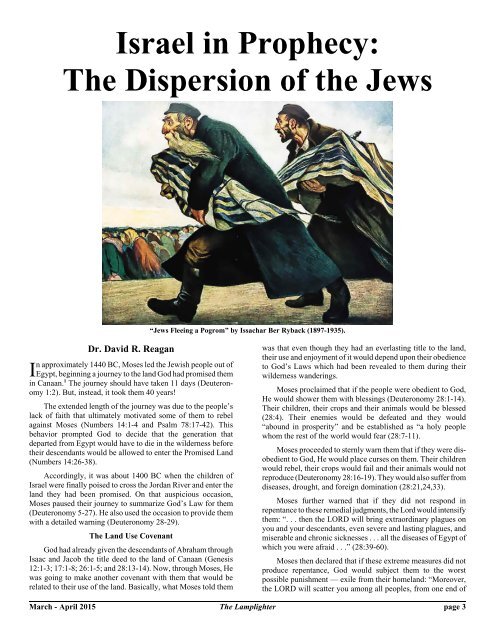Lamplighter_MarApr15_Dispersion-Jews
Lamplighter_MarApr15_Dispersion-Jews
Lamplighter_MarApr15_Dispersion-Jews
You also want an ePaper? Increase the reach of your titles
YUMPU automatically turns print PDFs into web optimized ePapers that Google loves.
Israel in Prophecy:<br />
The <strong>Dispersion</strong> of the <strong>Jews</strong><br />
“<strong>Jews</strong> Fleeing a Pogrom” by Issachar Ber Ryback (1897-1935).<br />
Dr. David R. Reagan<br />
In approximately 1440 BC, Moses led the Jewish people out of<br />
Egypt, beginning a journey to the land God had promised them<br />
in Canaan. 1 The journey should have taken 11 days (Deuteronomy<br />
1:2). But, instead, it took them 40 years!<br />
The extended length of the journey was due to the people’s<br />
lack of faith that ultimately motivated some of them to rebel<br />
against Moses (Numbers 14:1-4 and Psalm 78:17-42). This<br />
behavior prompted God to decide that the generation that<br />
departed from Egypt would have to die in the wilderness before<br />
their descendants would be allowed to enter the Promised Land<br />
(Numbers 14:26-38).<br />
Accordingly, it was about 1400 BC when the children of<br />
Israel were finally poised to cross the Jordan River and enter the<br />
land they had been promised. On that auspicious occasion,<br />
Moses paused their journey to summarize God’s Law for them<br />
(Deuteronomy 5-27). He also used the occasion to provide them<br />
with a detailed warning (Deuteronomy 28-29).<br />
The Land Use Covenant<br />
God had already given the descendants of Abraham through<br />
Isaac and Jacob the title deed to the land of Canaan (Genesis<br />
12:1-3; 17:1-8; 26:1-5; and 28:13-14). Now, through Moses, He<br />
was going to make another covenant with them that would be<br />
related to their use of the land. Basically, what Moses told them<br />
was that even though they had an everlasting title to the land,<br />
their use and enjoyment of it would depend upon their obedience<br />
to God’s Laws which had been revealed to them during their<br />
wilderness wanderings.<br />
Moses proclaimed that if the people were obedient to God,<br />
He would shower them with blessings (Deuteronomy 28:1-14).<br />
Their children, their crops and their animals would be blessed<br />
(28:4). Their enemies would be defeated and they would<br />
“abound in prosperity” and be established as “a holy people<br />
whom the rest of the world would fear (28:7-11).<br />
Moses proceeded to sternly warn them that if they were disobedient<br />
to God, He would place curses on them. Their children<br />
would rebel, their crops would fail and their animals would not<br />
reproduce (Deuteronomy 28:16-19). They would also suffer from<br />
diseases, drought, and foreign domination (28:21,24,33).<br />
Moses further warned that if they did not respond in<br />
repentance to these remedial judgments, the Lord would intensify<br />
them: “. . . then the LORD will bring extraordinary plagues on<br />
you and your descendants, even severe and lasting plagues, and<br />
miserable and chronic sicknesses . . . all the diseases of Egypt of<br />
which you were afraid . . .” (28:39-60).<br />
Moses then declared that if these extreme measures did not<br />
produce repentance, God would subject them to the worst<br />
possible punishment — exile from their homeland: “Moreover,<br />
the LORD will scatter you among all peoples, from one end of<br />
March - April 2015 The <strong>Lamplighter</strong> page 3


